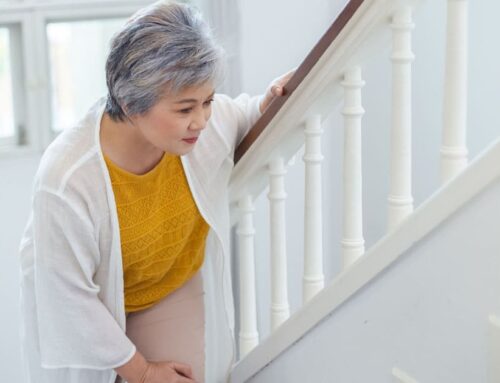Some decisions in life are more difficult than others – such as helping your parents choose where they’ll receive the best support for a high quality of life. Initially, at-home care is often the preferred solution, but as the years pass it might not be the most beneficial choice for their overall health and well-being.
If the level of needed care is exceeding what can reasonably be provided at home, your loved ones may experience an increased risk to their physical, cognitive and emotional health.
Being proactive can make all the difference. If at-home care is no longer able to provide support for a full and meaningful life, you might want to consider the option of senior living – where your parents will receive not only assistance and care but opportunities to make new friends, participate in activities and socially engage.
But how do you know when additional support or services might be required?
7 signs that at-home care may not be sufficient
Here are some indications that more assistance is needed or that your loved ones are no longer able to live their best life possible at home.
#1: Requiring increased assistance
If your parents require more attention with daily tasks, it might be time to consider other sources of assistance. If you’ve already provided additional hours of care yourself, asked friends and other family members to pitch in, or contracted more hours with professional caregivers, it’s time to search for another solution.
#2: Safety concerns
Frequent falls, wandering or incidents due to forgetfulness, like leaving the stove on, can pose serious risks to both your loved ones and their home. Also, many houses were typically not designed with aging in mind, and your parents’ home may require extensive and expensive renovations for accessibility.
#3: Declining nutrition
Noticeable changes such as weight gain or loss and refrigerators and cabinets almost empty are signs that your loved ones are struggling to shop for and prepare healthy foods. Unfortunately, solutions often become substituting snacks or processed foods or even skipping meals altogether.
#4: Social isolation
It’s not uncommon for older adults who live at home to become isolated from activities and others. The causes may include no longer driving, having few transportation opportunities or living with chronic conditions or mobility issues. When considering the quality of at-home care, you’ll want to pay attention to any lack of social interaction as this can lead to loneliness and depression.
#5: Household maintenance challenges
Maintaining the home, both inside and out, can become too challenging and can even create an unsafe living environment for your loved ones. If family members, friends and neighbors are already contributing and if you’ve hired at-home care professionals but there still remains a gap, it may be time to consider another option.
#6: Cognitive decline
If your parents are beginning to live with Alzheimer’s disease or other forms of dementia, the ability to continue with at-home care will likely be limited. Depending on the time and resources family members can contribute, it may become impossible for your loved ones to have access to activities and social interaction or remain safely at home.
#7: Caregiver burnout
If one of your parents fills the role of caregiver, you’ll want to be aware of any changes in physical and emotional health. Caregivers are often overwhelmed, exhausted or stressed with the responsibilities, which can negatively impact both their well-being and the quality of care provided.
Download our complimentary Successful Transitions guide.
At-home care vs. the benefits of moving into a senior living community
Many families consider the solution of a senior living community as a positive change when at-home care is no longer working. The benefits extend to both older adults and their children:
- Professional care: Your loved ones will have access to assistance daily, which can include help with bathing, dressing, grooming and medication management.
- Safety and security: Senior living communities provide features like emergency call systems, secure buildings and staff trained to handle emergencies and provide immediate assistance.
- Social engagement: Residents enjoy a full social life with various planned activities and events to interact. Making new friends reduces the risk of loneliness and depression.
- Nutritious meals: Balanced, chef-prepared meals that cater to the dietary needs of the residents ensure proper nutrition, which is critical for maintaining good health and energy levels.
- Housekeeping and maintenance: Communities provide housekeeping and maintenance services so that residents can live in a clean, well-maintained environment without the physical strain or stress of home upkeep.
- Fitness and wellness programs: Regular access to fitness classes, wellness programs and on-site amenities like gyms or walking paths help residents stay active and healthy.
- Transportation services: Scheduled transportation for shopping, medical appointments and social outings ensures that residents remain mobile and engaged with the broader community.
- Peace of mind for families: Knowing their loved ones are in a safe, supportive environment gives families peace of mind, allowing them to focus on spending quality time together rather than worrying about daily care needs.
The Charleston Senior Living Community
Locally owned and operated, we offer personalized care by our dedicated team members. Setting a new standard in Assisted Living and Memory Care, we don’t define our residents by their limitations or illness but instead believe in focusing on the positive and the possibility.
The Charleston Senior Community includes private apartments for assisted living residents and for those living with Alzheimer’s or dementia. Your loved ones will benefit from our attention to detail, routine health assessments, delicious dining and daily activity programs as we support everyone to live their best life.
Consider a few of our amenities:
Chef-led dining program
Community movie theater
Salon
Ballroom
Live entertainment
Outdoor patio
Social lounges
Housekeeping
If you or your family are thinking about Assisted living or Memory care, we hope you will consider The Charleston Senior Community. We are a trusted resource and are here to answer any questions, contact us today.
We also invite you to download our complimentary Successful Transitions guide to learn more about making the move to senior living.









